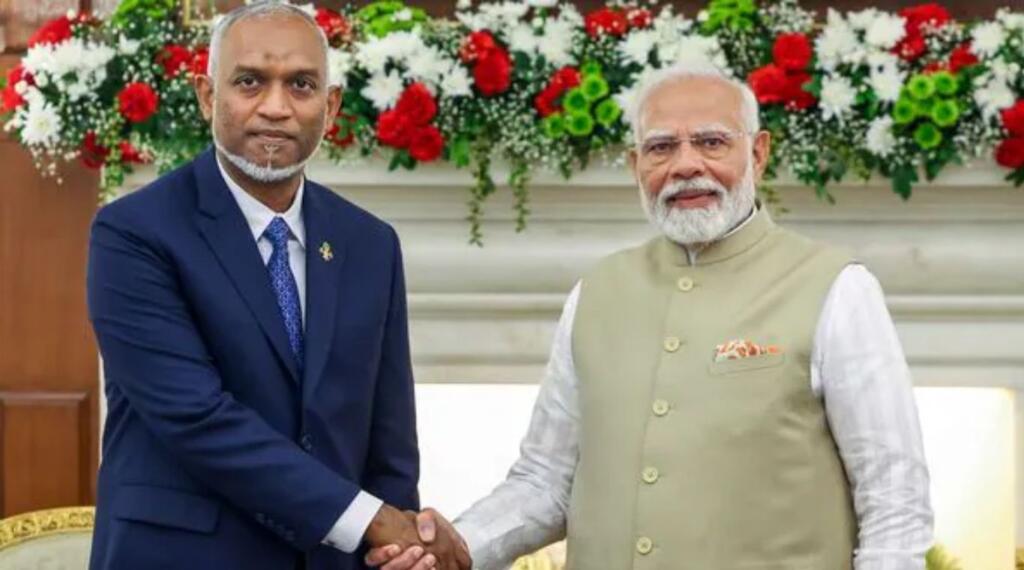‘India Out’ is out. For Maldives, India once again is a foreign policy priority. President Mohamed Muizzu is a softened man as he met Prime Minister Narendra Modi during his first state visit to New Delhi on Monday, October 7. He is eager that the bitter past is forgotten, quickly if possible.
It took a fast-approaching deadline for repaying a hefty loan installment to convince Miuzzu that of its neighbours India is the only bankable country that can come to his country’s aid despite the ill-treatment meted out to it.
The Maldives has to repay India $400.9 million by the year’s end. The country already has an external debt of 3.57 billion, over 40% of which is owned by China alone, and Beijing, too, is getting concerned about its repayment schedule.
In September 2024, The Diplomat gave a clear picture of the financial mess Maldives finds itself in. “To avoid defaulting on creditors, the Maldives needs $114 million this year, $557 million in 2025, and a staggering $1.07 billion in 2026. The latter figure eclipses a gross foreign currency reserve that stood at $437 million at the end of August. This amount – the lowest in eight years – was only sufficient to cover about 1.5 months of imports, Moody’s noted, portending a dire situation for a small island state reliant on imported food, fuel, and medicine.”
Since it helped the Maldives during the tsunami in 2004 by being the first responder with money and other aid, New Delhi, despite growing Maldivian diatribes, has always stood by the island nation. It did not hesitate to send troops when the Maldives faced a coup attempt.
India has helped build several infrastructure projects in Maldives, including a hospital, a polytechnic, affordable houses, a technology adoption centre, and a national college of police and law enforcement apart from water and sanitation plants.
So, when Miuzzu met Modi on Monday, there appeared no references to the anti-India past. Instead, the leaders inked an agreement on a currency swap to the tune of $400 million which will help the Maldives tide over foreign exchange reserve issues and other financial assistance.
The Rupay card will also be launched in the Maldives. The country’s Hanimadhoo International Airport now has a new runway which has been inaugurated and Muizzu got an assurance that bilateral ties will be further strengthened.
Muizzu is a practical man who can jettison past anger if it does not suit his country. His climb down is already being described as a U-turn or, strongly, a volte-face, by Indian media.
Obviously, the financial burden was becoming unbearable. The pressure from China for honouring heavy-duty debt repayments was increasing. He International Monetary Fund’s recent warning about the precarious financial situation of Maldives must be ringing in his ears. He could not ignore the advice of the opposition parties back home that he can no longer afford to be stubborn in dealing with India.
Miuzzu’s U-turn on Monday was a mere formality
The process began much earlier, in March, when Miuzzu began to ease his stand. He was a visibly changed man when Indian Foreign Minister S Jaishankar no less visited Maldives this August to thrash out the bilateral relationship so that Miuzzu could proceed with his state visit in October.
The president realised he could no longer extract juice from the “India Out” campaign of his that brought him to power in his country. Reality hit him in the face and Miuzzu admitted as much during Jaishankar’s visit.
The president said: “India has always been one of our closest allies and invaluable partners, facilitating and providing aid whenever we need it.”
But he did not surrender. He did everything short of saying sorry, giving the impression that he would maintain good relations with any country that respected Maldivian sovereignty. That was an oblique reference to his demand for the exit of the small contingent of Indian soldiers from the island.
Recently, the island’s prominent media organisation, Dhauru, gave him solid advice. Its edited Moosa Latheef came out with a piece titled, “How can the Maldives forsake India?”
He wrote: “The president noted India’s assistance to the Maldives in his speech with the aim of strengthening relations between the two countries anew in the future. He is the one who bears responsibility for saving the country from the slump in the economy over the country’s foreign debt. Therefore, the government knows how important Indian assistance is to the Maldives at this juncture.”
Things have now come full circle. The ‘pro-China’ leader who led an ‘anti-India’ campaign to come to power in Maldives admitted on Monday in New Delhi that India is one of his country’s largest trade and development partners and “a valued partner and friend”.
The inevitability of the U-turn was predicted by Carnegie’s South Asia Program which in a research article in 2022, titled ‘The Maldives’ Tig of War Over India and National Security”, as part of its Politics Opposition in South Asia initiative, perhaps wrote the last word.
It cautioned Maldives saying: “…if the India Out campaign rankles the Indian government, the ones who will suffer are the ordinary Maldivian citizens who rely on India for medical treatment, visas, and economic support. This concern is not idle speculation; the souring of bilateral relations in earlier periods (from 2013 to 2018) during the previous administration had an impact on ordinary citizens. More importantly, if bilateral relations take a dip, who will replace India as the Maldives’ main backer?”
